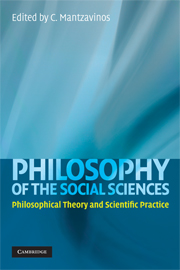Book contents
- Frontmatter
- Contents
- List of Contributors
- Acknowledgements
- Introduction
- Part I Basic Problems of Sociality
- Part II Laws and Explanation in the Social Sciences
- Part III How Philosophy and the Social Sciences Can Enrich Each Other: Three Examples
- 8 Why Do People Cooperate as Much as They Do?
- Comment
- 9 Situations Against Virtues: The Situationist Attack on Virtue Theory
- Comment
- 10 What Kind of Problem is the Hermeneutic Circle?
- Comment
- Epilogue
- Name Index
- Subject Index
- References
Comment
Putting the Problem of Social Order Into Perspective
Published online by Cambridge University Press: 05 June 2012
- Frontmatter
- Contents
- List of Contributors
- Acknowledgements
- Introduction
- Part I Basic Problems of Sociality
- Part II Laws and Explanation in the Social Sciences
- Part III How Philosophy and the Social Sciences Can Enrich Each Other: Three Examples
- 8 Why Do People Cooperate as Much as They Do?
- Comment
- 9 Situations Against Virtues: The Situationist Attack on Virtue Theory
- Comment
- 10 What Kind of Problem is the Hermeneutic Circle?
- Comment
- Epilogue
- Name Index
- Subject Index
- References
Summary
Cooperation and the Classical Social Order Problem
“The possibility of co-operation” (Taylor 1976, 1987) has been on the social theory agenda ever since the British Moralists (Raphael 1969 and Schneider 1967). They already perceived the “Hobbesian problem of social order” as an obstacle to – what later researchers came to see as – “rational choice explanations” of cooperation and social order. The British Moralists were not only aware of the problem but from their discussion a quite convincing solution of the problem emerged. The pinnacle of the ongoing discussion was reached with the solution of the order problem presented by David Hume in his Treatise on Human Nature (Hume 1739, 1978). Hume relied already on a, to use Woodward's term, SIRG (self-interest in repeated games) account of interaction. But he went beyond that in a direction Woodward is hinting at as well. Hume, like other of the British Moralists also insisted on the role of norm guided and rule following behavior. Hume emphasized already the crucial role of conventions and their evolution in solving the social order problem (Sugden 1986).
According to Hume conventions are not simply regularities in behavior corresponding to stationary equilibrium choices in a repeated game. The relevant equilibrium notion went beyond behavior to conviction systems and the intentional pursuit of rules (as later made precise in the concept of an internal point of view (Hart 1961)). Hume, besides drawing attention to SIRG, insisted in the British Moralist tradition on what then was called “opinion.”
- Type
- Chapter
- Information
- Philosophy of the Social SciencesPhilosophical Theory and Scientific Practice, pp. 266 - 273Publisher: Cambridge University PressPrint publication year: 2009

